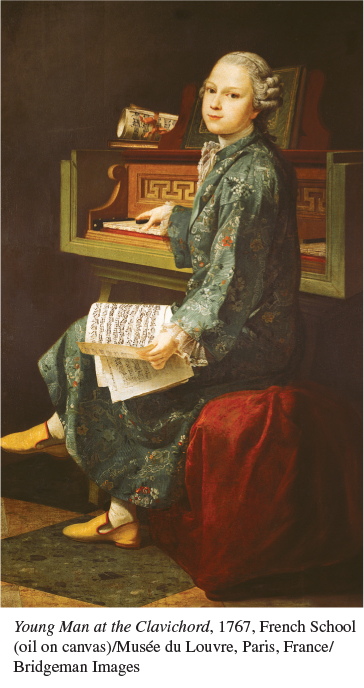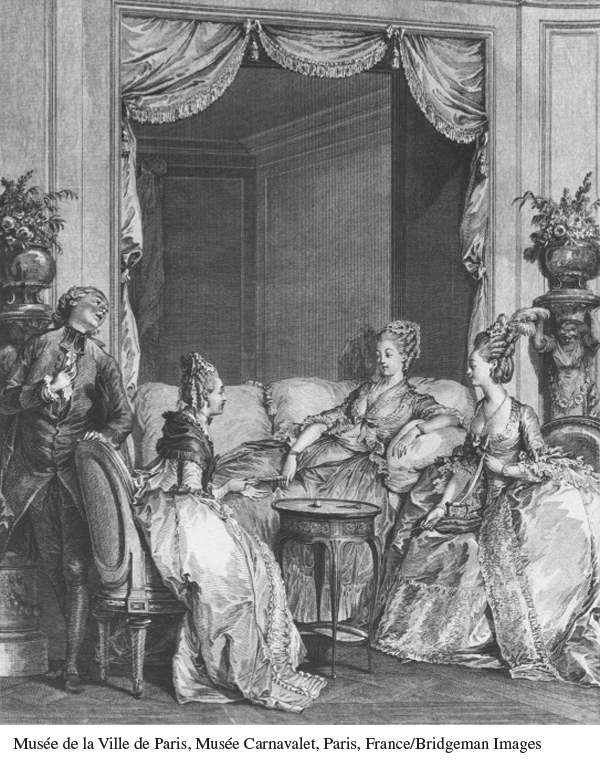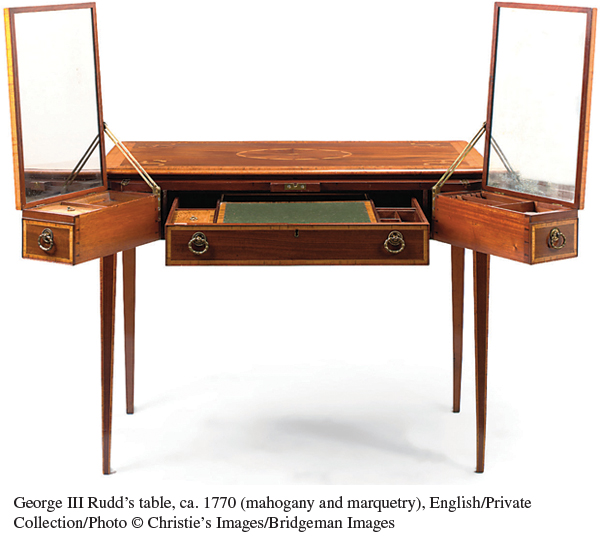Thinking Like a Historian: A New Subjectivity
594
A New Subjectivity
Traditional European society was organized into groups that shared common values: families, parishes, guilds, and social ranks. Most people’s time was spent working and socializing alongside people of the same milieu. The eighteenth century introduced a new, more private and individualized sense of self. Artisans and merchants created a host of material goods that allowed men and women to pursue this new subjectivity in comfort and style.
| 1 |
Jean- |
![]() I have resolved on an enterprise which has no precedent, and which, once complete, will have no imitator. My purpose is to display to my kind a portrait in every way true to nature, and the man I shall portray will be myself.
I have resolved on an enterprise which has no precedent, and which, once complete, will have no imitator. My purpose is to display to my kind a portrait in every way true to nature, and the man I shall portray will be myself.
Simply myself. I know my own heart and understand my fellow man. But I am made unlike any one I have ever met; I will even venture to say that I am like no one in the whole world. I may be no better, but at least I am different. Whether Nature did well or ill in breaking the mould in which she formed me, is a question which can only be resolved after the reading of my book. . . .
I have displayed myself as I was, as vile and despicable when my behavior was such, as good, generous, and noble when I was so. I have bared my secret soul as Thou thyself hast seen it, Eternal Being! So let the numberless legion of my fellow men gather round me, and hear my confessions.
| 2 | Pierre Choderlos de Laclos, Les Liaisons Dangereuses, 1782. Like other elite young women of her day, the fictional heroine of this novel found privacy in a small room, or cabinet, of her own where she could read, write, and reflect. It contained a locked desk where she hid her love letters. |
![]() You see, my good friend, [that] I am keeping my word to you, and that bonnets and pompons do not take up all my time; there is some left for you. . . .
You see, my good friend, [that] I am keeping my word to you, and that bonnets and pompons do not take up all my time; there is some left for you. . . .
| 3 | The dressing gown. Dressing gowns became popular in the eighteenth century as a warm and comfortable garment for reading, writing, and relaxing in the privacy of the home, before putting on formal wear to go out to dinner or the theater. |

595
| 4 |
The bedroom. Architects helped create private spaces where the new subjectivity could develop. As Louis- |

| 5 | Dressing table. This dressing table could double as a writing desk when its cleverly constructed drawers were folded away. Probate inventories show a strong rise in the number of mirrors, writing desks, and toilette items owned by men and women over the course of the eighteenth century. |

ANALYZING THE EVIDENCE
- What did Rousseau think was new and important about the autobiography he was writing (Source 1)?
- What do the material objects displayed in Sources 3, 4, and 5 tell us about the new subjectivity? Why would historians turn to material objects to understand shifts in the understanding of the self? Do you see advantages or limitations to this approach?
- Think about how different groups of people might have experienced subjectivity in distinctive ways. Why might a private room and a locked desk be particularly important for a young woman (Source 2)? What challenges would the poor face in following the path traced by Rousseau (Source 1)?
PUTTING IT ALL TOGETHER
Using the sources above, along with what you have learned in class and in this chapter, write an essay that explores the connection in the eighteenth century between social relationships, the changing material circumstances of life, and developing ideas of the individual and the self.
Sources: (1) Jean-